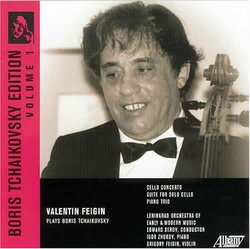Album DescriptionAlbany Records has undertaken a series of recordings devoted to the music of Boris Tchaikovsky in honor of what would have been his 80th year. The series will contain forgotten masterful performances by famous musicians, some of them now deceased, including recordings from the private archives of the performers as well as brand new world premiere recordings organized by the Boris Tchaikovsky Society in Russia. The perception of contemporary Russian music in the West is currently under revision. The post-Shostakovich era was once thought of as no more than a haven for the avant garde, with names such as Edison Denisov, Alfred Schnittke, and more recently, Sophia Gubaidulina, Galina Ustvolskaya, and others, claiming the limelight. But times are changing. A handful of lesser-known composers whose work stands at a stylistic crossroads between Shostakovich and their more celebrated counterparts are gradually coming into focus. These composers ? they include such figures as Mieczeslav Weinberg, Andrei Eshpai, Boris Tishchenko, Georgi Sviridov, Gavriil Popov, Nikolai Peiko, and Revol Bunin ? demonstrate that Russian music in the latter half of the 20th century is far richer and more varied than was previously imagined. Included in this distinguished company is Boris Tchaikovsky, hailed by such eminent figures as Shostakovich and Rostropovich as one of the most original voices of his generation (he bears no family relation to his famous 19th century namesake). His work offers an ever-fresh source of lyrical inventiveness and new formal possibilities, written in a contemporary style that embraces beauty, depth of expression, and accessibility. He was trained at the Moscow Conservatory at the worst of times: during Stalin?s notorious postwar assault on the arts. To his credit, he refused to take part in the officially authorized tirades against the terrorized Shostakovich, who was banned from the Conservatory at the time, and whose former students, Tchaikovsky being one of them, were branded as "contaminated." He graduated in 1949, not totally unscathed himself, yet having studied under three of the most prominent masters of instrumental music of the time ? Shostakovich, Miaskovsky and Shebalin. The cultural thaw of the early 1960s opened many doors for Soviet composers. Tchaikovsky?s own artistic development was also in flux. The lyricism that lay at the base of his musical thinking was undergoing profound metamorphosis. That lyricism was progressively becoming couched within a fresh, mosaic style whereby the music?s surface is carved into a succession of bold, accentuated utterances. The curious rhythmic rigidity of these utterances ? a Tchaikovsky hallmark ? is offset by considerable flexibility in the music?s other variables, such as increased levels of dissonance and colorful instrumental contrasts. He had now found his own mature voice, which allowed him to create a powerful new language that was distinctly Russian in sound, thoroughly up-to-date, and capable of a wide range of expression. It is the language for all his future compositions and can be heard in this wonderful new CD.


 Track Listings (3) - Disc #1
Track Listings (3) - Disc #1